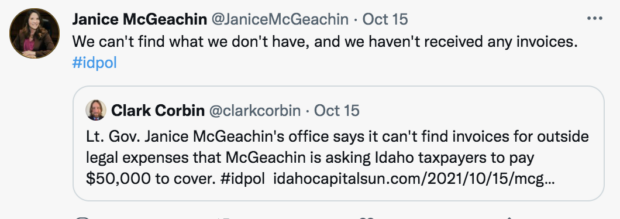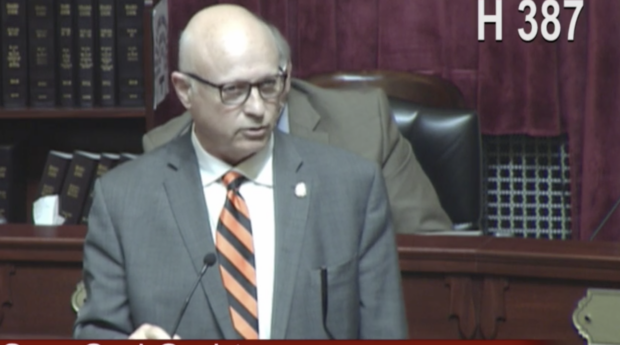Maybe even Janice McGeachin isn’t serious about the $50,000.
Maybe the lieutenant governor’s unsupported request to cover legal fees is part of a long game. To energize her base, to further distance herself from the Statehouse insiders — and to get in another shot at the media, because why not?
Either way, things are getting weird. McGeachin is running a chaos campaign for governor, simple as that.
To recap: The latest bizarre chapter began a week ago, when McGeachin and attorney general’s candidate Art Macomber addressed reporters during a nine-minute appearance at Ammon Elementary School. It wasn’t a “press conference,” as McGeachin called it, since neither she nor Macomber took questions from reporters. It was more of an attempt to scold and shame reporters who have requested public comments to her education indoctrination task force — documents that, according to a district judge, are unquestionably public records.
McGeachin and Macomber didn’t just bash the invited reporters. Gotta mix up the fastballs with the off-speed stuff, after all. They worked in some swipes at Attorney General Lawrence Wasden’s office, in hopes of shifting the blame for a public records debacle of her own making.
There was a lot to process from their brief appearance. But let’s stick to one point, since it’s germane to this discussion. McGeachin accused the media of blatantly lying about her, saying she wants taxpayers to cover her legal bills.
Except that, well, McGeachin wants taxpayers to cover her legal bills.
She has asked for a $50,000 state appropriation — partly to reimburse the Idaho Press Club for its successful, $29,000 lawsuit. (Full disclosure: Idaho Education News was one of several media organizations that sought the comments to McGeachin’s task force, and we support the Press Club’s lawsuit.)
That leaves $21,000 unexplained. And as Clark Corbin of the Idaho Capital Sun reported Friday, McGeachin’s office can’t produce paperwork that breaks down her legal bills.
 “We can’t find what we don’t have, and we haven’t received any invoices,” McGeachin tweeted, unconvincingly.
“We can’t find what we don’t have, and we haven’t received any invoices,” McGeachin tweeted, unconvincingly.
And this doesn’t feel new or out of character. Instead, it is consistent with a campaign that has been defined by several traits, gravitas not among them.
Recently, veteran Idaho political columnist Chuck Malloy called out McGeachin for showboating, and said this month’s short-lived but extremely public battle over COVID-19 executive orders was a weak attempt to bolster a campaign “that appears to be floundering, at best.”
Malloy, a former spokesman for the Idaho House’s Republican caucus, pointed out that McGeachin was a serious, hard-working lawmaker who chaired the House Health and Welfare Committee and served on the budget-writing Joint Finance-Appropriations Committee, the most serious, hard-working committee in the Legislature.
“Personally, I prefer the ‘old’ version of McGeachin to the one I’ve been seeing,” Malloy wrote.
Tough luck, Chuck. You’re getting the “new” McGeachin. A chaos candidate who is looking to unseat Gov. Brad Little by appealing to the hardcore faction of the Idaho GOP with a steady diet of red meat. That means, expect more of the same from the McGeachin Twitter feed: tweets decrying vaccine mandates and talking up natural immunity to COVID-19, tweets defending a 50-state audit of the 2020 presidential election, almost a year after the fact, and so on.
It’s clear that McGeachin wants to emulate her political role model, former President Trump, and set the narrative 280 characters at a time. In 2020, the formula worked well enough for Trump to carry Idaho with nearly 64 percent support. So in that context, McGeachin’s political calculus makes sense.
But even if chaos works as a campaign strategy, it doesn’t make for good governing. It doesn’t necessarily work, for instance, to ask for a $50,000 taxpayer reimbursement without any proof to back it up. And it’s fair to ask if McGeachin would take a similarly sloppy approach to the bigger, costlier fiscal deliberations that come with the governor’s job.
Surprisingly, JFAC gave McGeachin a reprieve this week, during its annual fall meeting. The budget committee blasted through a list of 37 supplemental budget requests Tuesday without even discussing McGeachin.

“The Tuesday discussion wouldn’t have made much difference, as (McGeachin’s request) will be thoroughly evaluated in January,” said Sen. Carl Crabtree, R-Grangeville, a JFAC member.
Another JFAC member, Rep. Wendy Horman, R-Idaho Falls, said she would be surprised to see the request get through the committee.
Maybe so. But that doesn’t eliminate the potential for chaos. McGeachin’s de facto running mate, lieutenant governor’s candidate and state Rep. Priscilla Giddings, sits on JFAC. And McGeachin and Giddings have a cadre of hardline allies in the House — enough for a floor fight, if JFAC writes a lieutenant governor’s budget bill that doesn’t meet with McGeachin’s approval.
No, $50,000 isn’t huge in the context of a $4 billion state budget. But $50,000 passes the “teacher test.” In other words, it would cover a year’s salary for a starting teacher — as opposed to going to lawyers, for largely unexplained legal bills.
There was a time when such a phantom funding request would have infuriated Statehouse conservatives. It might well have incensed McGeachin, back in her JFAC days.
But these days, McGeachin is in chaos campaigning mode.
Idaho Education News has submitted a public records requests for documents involving McGeachin’s office, Wasden’s office, and McGeachin’s outside attorneys.
Each week, Kevin Richert writes an analysis on education policy and education politics. Look for his stories each Thursday.
